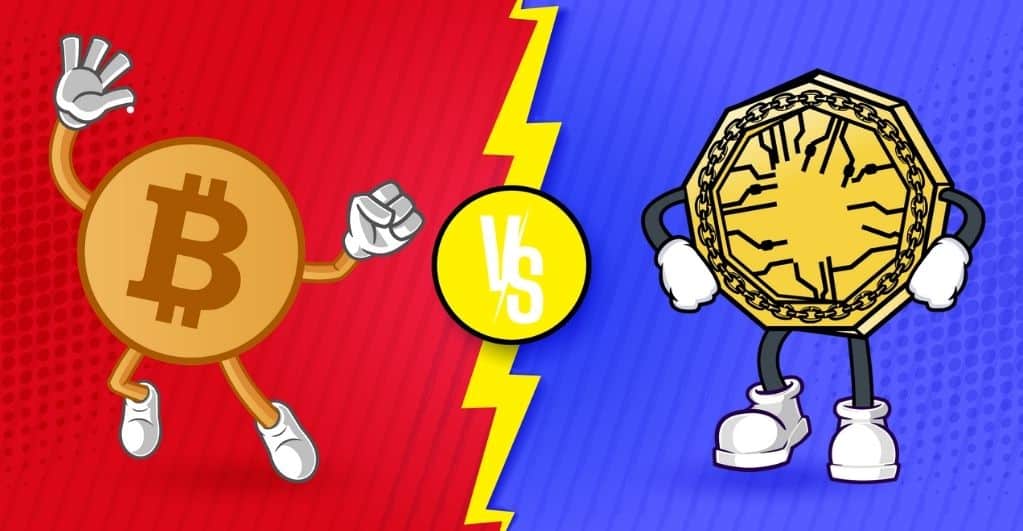Introduction
Knowing how to use technology is one thing, but understanding how it functions is quite another. And that is why learning the difference between Bitcoin and blockchain is crucial for people starting their crypto journey. Cryptocurrencies are gaining more popularity in the modern world due to their secure and swift design, which has been made possible thanks to blockchain technology. Many people use Blockchain and Bitcoin interchangeably, probably because they are so closely related. Blockchain is the technology that underpins the cryptocurrency Bitcoin, but Bitcoin is not the only version of a blockchain distributed ledger system in the market. There are several other cryptocurrencies with their own blockchain and distributed ledger architectures. Blockchain also has potential applications far beyond bitcoin and cryptocurrency.
What Is Bitcoin?
Two decades after blockchain technology was first outlined in 1991 by Stuart Haber and W. Scott Stornetta, Bitcoin(₿) came into existence in 2008. Created by an unknown person or group of people using the name Satoshi Nakamoto, the cryptocurrency began to be used in 2009 when its implementation was released as open-source software. Bitcoin offers the promise of lower transaction fees than traditional online payment mechanisms, and, unlike government-issued currencies, it is operated by a decentralized authority.
Bitcoins are not issued or backed by any banks or governments, nor are individual bitcoins valuable as a commodity. There are no physical bitcoins, but only balances kept on a public ledger that everyone has transparent access to. Despite it not being legal tender, Bitcoin is very popular and has triggered the launch of hundreds of other cryptocurrencies, collectively referred to as altcoins.
What Is Blockchain?
Blockchain seems complicated, and it definitely can be, but its core concept is really quite simple. A blockchain is a type of database or public ledger comprising an open, peer-to-peer network that records all Bitcoin transactions anonymously. Aside from enabling the transfer of digital assets, blockchain acts as a gateway to share anything of value cost-effectively and securely. The concept of blockchain dates back to 1991 and is the very foundation of Bitcoin. It has three main components – blocks, miners, and nodes that work in tandem to verify online transactions.
It uses a consensus mechanism, where network participants must validate each Bitcoin transaction with proof of work. But before that, miners solve a complex mathematical puzzle to legitimate transactions and store them in blocks. Once it is done, transactions are recorded in the ledger. Nodes are servers that copy all the transaction data to keep the blockchain secure and prevent data breaches.
Key Differences Between Bitcoin And Blockchain
- Blockchain is a distributed ledger technology, while Bitcoin is an open-source code running on it.
- The blockchain serves as the architecture for crypto and altcoins and is used for various industrial applications. Bitcoin is purely a cryptocurrency for investment, trading, and currency exchange purposes.
- The blockchain ledger is public, but Bitcoin payments are anonymous.
- Blockchain enables the transfer of digital assets and data like property rights, while Bitcoin is limited to exchanging virtual currencies.
- Blockchain records Bitcoin transactions, and Bitcoin is used for peer-to-peer fund transfers.
Scope Of Bitcoin And Blockchain
Bitcoin is neither regulated by any federal authority or central bank nor any administrator or intermediary controls Bitcoin transactions. It gives people and entities autonomy of their funds. As it happens, Bitcoin can be used for daily transactions and kept as an asset that grows in value. But lack of legal acceptance limits its scope.
Blockchain’s ability to create a reliable, secure, and transparent environment for asset and data transfer makes it a desirable technology in different sectors. Industrial use cases of blockchain include creating intelligent contracts, audit supply chains, storing public health records, identity management, etc.
Future Of Bitcoin And Blockchain
As the supply of Bitcoin decreases, its price is reaching record highs. Because of its growing popularity, virtual currency is now being used in different business transactions, such as online gambling and esports. Also, it does away with any third-party payment processor that enhances security.
Blockchain is the next big thing in cyberspace because it uses a complex yet tamper-proof network that creates an immutable ledger of transactions. Also, it can transfer valuable assets and information between two parties. For that reason, it has wide applications in the automobile, healthcare, aviation, online casinos, fintech, and telecom industries.
Conclusion
Bitcoin has been on a wild roller-coaster ride of ups and downs. It was the first cryptocurrency and continues to be the best-known. At first, nobody paid attention to Satoshi’s wild ideas – but slowly, more and more people started buying and using Bitcoin. Many believed it was the future of money, and the worse the big banks behaved, the more popular it became. So If you want to make the investment in Bitcoin to make good money from it then you must know about the Bitcoin Code platform. It is an automated trading platform that can help you make good money from Bitcoin trading. Check out Bitcoin Code Reviews by industry experts to know more further about this amazing platform.
From the technology that made the existence of cryptocurrencies possible to a technology that has the makings to revolutionize all industries and government processes – blockchain has come a long way over the last decade. It’s only now that we’re starting to understand its full potential. Blockchain technology has the potential to result in a radically different competitive future for the financial services industry.




